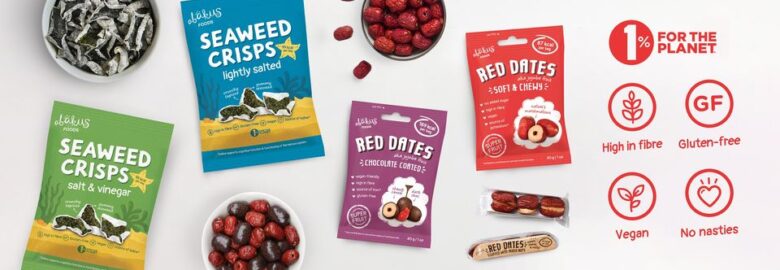Abakus Foods
Healthy Snacks for Busy People
Healthy Vegan Snacks
About Abakus Foods
Abakus Foods helps people discover and harness the power of natural foods.
This London-based health food brand was launched by Helen Wang, who was working long hours in London’s finance and her health was deteriorating. Her mum sent her care parcels containing healthy snacks and she loved them so much that she decided to bring them over here and make them available for everyone to enjoy.
These days, Abakus Foods brings you savoury and sweet vegan snacks made of natural ingredients and bursting in nutrients, to help you enjoy healthy foods and be at your best.
Marine Conservation Society
Wildlife Conservation Society
The Wildlife Conservation Society saves wildlife and wild places worldwide through science, conservation action, education and inspiring people to value nature. WCS also remains dedicated to carrying on with our important work to save wildlife, protect nature’s strongholds and inspire people to value nature around the world.
One Tree Planted
One Tree Planted is focused on global reforestation. They are on a mission to reforest our planet and provide education, awareness and engagement on the importance of trees in our ecosystem. One Tree Planted helps get trees in the ground to restore forests after fires and floods, create jobs, build communities, and protect habitat for biodiversity.
Fareshare
FareShare is the UK’s leading charity fighting hunger and food waste. They redistribute good quality surplus food that would otherwise go to waste to frontline charities and community groups that support vulnerable people.
Nutritious and Delicious; The Beauty of Our Seaweed Crisps
Seaweed with a real crunch! Scrumptious seaweed coated with crispy tapioca to make an irresistible snack. No nasties, just goodness from the sea.
Here’s why they are the perfect ‘better-for-you’ alternative to potato crisps:
The Seaweed
Seaweed is known by many in the Far East, and increasingly more people around the world, for its important health and nutritional benefits. A key health benefit is that Seaweed is a source of Iodine, and Tyrosine, which support cognitive and nervous system functions. Iodine, commonly found in dairy and meat products, is particularly important if you are on a vegan or vegetarian diet.
A nutritious diet is packed full of vitamins and minerals, and Seaweed is a great source of vitamins A, C E and K, as well as folate, zinc, sodium, calcium, and magnesium.
The Tapioca
Tapioca is a starch extracted from the Cassava plant and is a great for a gluten-free and wheat-free diet. Being a ‘resistant starch’ means that it feeds healthy gut bacteria to the gut, which helps reduce inflammation and increase fullness.
How to Eat
Our Seaweed Crisps come in three flavours; Lightly Salted, Salt & Vinegar, and Cheese flavour. They are ideal for when you need a snack to accompany your sandwich at lunch, or for when you’re on-the-go. They can even be sprinkled over salads and soups to create an extra crunch! If you’re feeling creative, you could make fun rice balls with them or savoury granola.
Heritage
Around the world there are 145 species of Seaweed used as food, people in the Far East, especially in coastal areas, have eaten seaweed for centuries as part of their daily diet. Tapioca has been used widely by South East Asian cultures, and in modern times too, for instance tapioca pearls are an essential ingredient of bubble tea.
About Jujube Fruit / Red Date
Jujube Fruit / Red Date – Ancient Superfood From Far East
The Jujube fruit, also called the Red Date, has been enjoyed for its health and well-being properties since thousands of years in South-East Asia.
Packed with flavonoids, phenols and antioxidants, the fresh Jujube fruit has 20x more vitamin C than citrus fruits. It is also dense in Manganese and Iron, and boasts 18 out of the 24 important amino acids which are essential to the formation of more than 50,000 proteins found in the human body.
A number of scientific studies have found the jujube to be beneficial for insomnia, enhance mood, general gastrointestinal problems, anti-inflammation, anti-cancer, and blood pressure. The high levels of vitamins and minerals help boost the immune system, build red blood cells, and are beneficial for overall energy and vitality. It is considered an adaptogen, which can “adapt” to the body’s needs and help reduce stress.
In Traditional Chinese Medicine, the red date / jujube is known as a warming food, and used to remove dampness, nourish the blood, calm the mind, and strengthen the body.
How to Eat
Mostly eaten dried, they taste soft, chewy, and have a naturally sweet, aromatic flavour. They make a tasty snack to fight sugar cravings, and are a versatile ingredient. For example, they can be used to sweeten porridge, smoothies, baking, energy balls. They can also be used in cooking in place of dried apples, dates, or goji berries. A top recipe tip is teared Jujube on peanut butter toast!
In Southeast Asia such as China and Korea, traditionally, people enjoy the jujube as a snack, steep it in hot water for a sweet tea, or use as an ingredient for a nourishing soup. They are often given to women after childbirth to help rebuild blood and replenish nutrients in the body. They can also be found in desserts and even in liqueurs.
To learn more ways to enjoy the jujube fruit, check out our blog where we regularly publish recipes. Go to blog.
Origin
Despite its alternative name “red date”, the jujube fruit is not a date but rather a species of Ziziphus in the buckthorn family. It has origins in China dating back more than 4000 years. Nowadays, it can be found in Southern Europe such as Italy, France, and Spain, in the Middle East, Australia, and USA. The tree can survive very cold weather and does not need much water – a true gift from mother nature.
Our red dates / jujube fruits are sourced from Xin Jiang, an autonomous region in the North West of China (bordering Kazakhstan) where the weather conditions are ideal for the highest quality jujube fruits, with lot’s of sunshine during the day and cold nights.
Sustainability
Did you know that jujube trees are very water efficient and draught resistant? They require very little water to thrive and are planted in arid regions to help fight against desertification. What a gift of nature!


